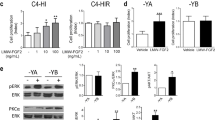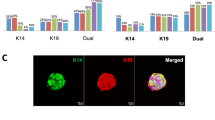Summary
The hormone dependency of the MCF-7 breast cancer cell line, while extensively tested in liquid culture, has not been previously evaluated under conditions of anchorage-independent growth in serum-free media. Using the soft agar clonogenic assay, we demonstrate that physiologically relevant concentrations of estradiol (E2), progesterone (Pg), and prolactin (PRL) similarly stimulated MCF-7 cell colony formation in the absence of serum. Addition of an anti-insulin-like growth factor-I (IGF-I) antibody inhibited E2- and Pg-stimulated growth, while PRL action was not affected. Similar results were obtained with an anti-IGF-I receptor antibody, except that its inhibitory effect on Pg-induced colony formation was modest and not statistically significant. Administration of either an anti-transforming growth factor-α (TGF-α) antibody or an anti-epidermal growth factor (EGF) receptor antibody similarly inhibited E2-stimulated MCF-7 cell growth in soft agar, while neither antibody influenced Pg or PRL effects. Addition of TGF-β1, -β2, -β3 similarly suppressed MCF-7 cell colony formation in a dose dependent manner to a degree comparable to that observed with 4-OH-tamoxifen (4-OH-T). Furthermore, the growth inhibitory effect of 4-OH-T was completely reversed by an anti-TGF-β antibody. We conclude that IGFs and TGF-α are important mediators of E2-stimulated MCF-7 cell growth in soft agar. IGFs may also be playing a role in Pg action, while neither growth factor is involved in PRL-stimulated colony formation. Finally, TGF-β appears to be an important mediator of antiestrogen-induced inhibition of tumor growth.
Similar content being viewed by others
Abbreviations
- IGF:
-
insulin-like growth factor
- TGF:
-
transforming growth factor
- E2 :
-
estradiol-17β
- Pg:
-
progesterone
- PRL:
-
prolactin
- 4-OH-T:
-
4-hydroxy-tamoxifen
- IMEM:
-
improved minimal essential medium
References
Yee D, Paik S, Lebovic GS, Marcus RR, Favoni RE, Cullen KJ, Lippman ME, Rosen N: Analysis of insulin-like growth factor I gene expression in malignancy: evidence for a paracrine role in human breast cancer. Molec Endocr 3: 509–517, 1989
Glickman PL, Manni A, Bartholomew M, Demers L: Polyamine involvement in basal and estradiol-stimulated insulin-like growth factor I secretion and action in breast cancer cells in culture. J Steroid Biochem Molec Biol 37: 1–10, 1990
Arteaga CL, Osborne CK: Growth inhibition of human breast cancer cellsin vitro with an antibody against the type I somatomedin receptor. Cancer Res 49: 6237–6241, 1989
Osborne CK, Coronado EB, Kitten LJ, Arteaga CI, Fuqua SAW, Ramasharma K, Marshall M, Li CH: Insulin-like growth factor-II (IGF-II): a potential autocrine/paracrine growth factor for human breast cancer acting via the IGF-I receptor. Molec Endocrinol 3: 1701–1709, 1989
Arteaga CL, Coronado E, Osborne CK: Blockade of the epidermal growth factor receptor inhibits transforming growth factor α-induced but not estrogen-induced growth of hormone-dependent human breast cancer. Molec Endocrinol 2: 1064–1069, 1988
Bates SE, Davidson NE, Valverius EM, Freter CE, Dickson RB, Tam JP, Kudlow JE, Lippman ME, Salomon DS: Expression of transforming growth factor α and its messenger ribonucleic acid in human breast cancer: its regulation by estrogen and its possible functional significance. Molec Endocrinol 2: 543–555, 1988
Ennis BW, Valverius EM, Bates SE, Lippman ME, Bellot F, Kris R, Schlessinger J, Masui H, Goldenberg A, Mendelsohn J, Dickson RB: Anti-epidermal growth factor receptor antibodies inhibit the autocrine-stimulated growth of MDA-468 human breast cancer cells. Molec Endocrinol 3: 1830–1838, 1989
Knabbe C, Lippman ME, Wakefield LM, Flanders KC, Kasid A, Derynck R, Dickson RB: Evidence that transforming growth factor-β is a hormonally regulated negative growth factor in human breast cancer cells. Cell 48: 417–428, 1987
Arteaga CL, Tandon AK, Von Hoff DD, Osborne CK: Transforming growth factor β: potential autocrine growth inhibitor of estrogen receptor-negative human breast cancer cells. Cancer Res 48: 3898–3904, 1988
Cohen FJ, Manni A, Glikman P, Bartholomew M, Demers L: Interactions between growth factor secretion and polyamines in MCF-7 breast cancer cells. Eur J Cancer 26: 603–608, 1990
Huff KK, Knabbe C, Lindsey R, Kaufman D, Bronzert D, Lippman ME, Dickson RB: Multihormonal regulation of insulin-like growth factor-I-related protein in MCF-7 human breast cancer cells. Molec Endocrinol 2: 200–208, 1988
Van der Burg B, Isbrucker L, van Selm-Miltenburg AJP, de Laat SW, van Zoelen EJJ: Role of estrogen-induced insulin-like growth factors in the proliferation of human breast cancer cells. Cancer Res 50: 7770–7774, 1990
Karey KP, Sirbasku DA: Differential responsiveness of human breast cancer cell lines MCF-7 and T47D to growth factors and 17β-estradiol. Cancer Res 48: 4083–4692, 1988
Manni A, Wright C, Badger B, Bartholomew M, Herlyn M, Mendelsohn J, Masui H, Demers L: Role of transforming growth factor-α-related peptides in the autocrine/paracrine control of experimental breast cancer growthin vitro by estradiol, prolactin, and progesterone. Breast Cancer Res Treat 15: 73–83, 1990
Burch WM, Weir S, van Wyk JJ: Embryonic chick cartilage produces its own somatomedin-like peptide to stimulate cartilage growthin vitro. Endocrinology 119: 1370–1376, 1986
Han VKM, Hill DJ, Strain AJ, Towle AC, Lauder JM, Underwood LE, D'Ercole J: Identification of somatomedin/insulin-like growth factor immunoreactive cells in the human fetus. Pediat Res 22: 245–249, 1987
Maciel RMB, Moses AC, Villone G, Tramontano D, Ingbar SH: Demonstration of the production and physiological role of insulin-like growth factor II in rat thyroid follicular cells in culture. J Clin Invest 82: 1546–1553, 1988
Murthy U, Basu A, Rodeck U, Herlyn M, Ross AH, Das M: Binding of an antagonistic monoclonal antibody to an intact and fragmented EGF-receptor polypeptide. Arch Biochem Biophys 252: 549–560, 1987
Rodeck U, Herlyn M, Herlyn D, Molthoff C, Atkinson B, Varello M, Steplewski Z, Koprowski H: Tumor growth modulation by a monoclonal antibody to the epidermal growth factor receptor: immunologically mediated and effector cell-independent effects. Cancer Res 47: 3692–3696, 1987
Manni A, Wright C: Polyamines as mediators of estrogen action on the growth of experimental breast cancer in rats. J Natl Cancer Inst 73: 511–514, 1984
Manni A, Wright C, Pontari M, Feil P, Joehl R: Hormone dependency of human breast neoplasms culturein vitro in the stem cell assay. J Natl Cancer Inst 74: 767–770, 1985
Manni A, Wright C, Davis G, Glenn J, Joehl R, Feil P: Promotion by prolactin of the growth of human breast neoplasms culturedin vitro in the soft agar clonogenic assay. Cancer Res 46: 1669–1672, 1986
Manni A, Wright C, Badger B, Lynch J, Demers L: Role of insulin-like growth factor-related peptides in the estradiol-, prolactin, and progesterone-stimulated growth of N-nitrosomethylurea-induced rat mammary tumors in soft agar. Cancer Res 50: 7179–7183, 1990
Ahmed SR, Badger B, Wright C, Manni A: Role of transforming growth factor alpha in basal and hormone stimulated growth by estradiol, prolactin and progesterone in human and rat mammary tumor cells: studies using TGF-α and EGF receptor antibodies. J Steroid Biochem Molec Biol 38: 687–693, 1991
Yen SSC: Prolactin in human reproduction. In: Yen SSC, Jaffe RB (eds) Reproductive Endocrinology. WB Saunders Company, 1986, pp 237–263
Lippman ME, Bolan G, Huff K: The effects of estrogens and antiestrogens on hormone-responsive human breast cancer in long-term tissue culture. Cancer Res 36: 4595–4601, 1976
Vignon F, Bardon S, Chalbos D, Rochefort H: Antiestrogenic effect of R5020, a synthetic progestin in human breast cancer cells in culture. J Clin Endocrinol Metab 56: 1124–1130, 1983
Braunsberg H, Coldham NG, Wong W: Hormonal therapies for breast cancer: can progestogens stimulate growth? Cancer Letters 30: 213–218, 1986
Shafie S, Brooks SC: Effect of prolactin on growth and the estrogen receptor level of human breast cancer cells (MCF-7). Cancer Res 37: 792–799, 1977
Shiu RPC: Prolactin, pituitary hormones, and breast cancer. In: Pike MC, Siiteri PK, Welsch CW (eds) Hormones and Breast Cancer: Banbury Report No 8. Cold Spring Harbor Laboratory Press, Cold Spring Harbor, NY, 1981, pp 185–196
Biswas R, Vonderhaar BK: Role of serum in the prolactin responsiveness of MCF-7 human breast cancer cells in long-term tissue culture. Cancer Res 47: 3509–3514, 1987
De Leon DD, Bakker B, Wilson DM, Hintz RL, Rosenfeld RG: Demonstration of insulin-like growth factor (IGF-I and -II) receptors and binding proteins in human breast cancer cell lines. Biochem Biophys Res Common 152: 398–405, 1988
Yee D, Favoni RE, Lupu R, Lebovic G, Cullen KJ, Huff KK, Lee YL, Powell DR, Lee PDK, Dickson RB, Rosen N, Lippman ME: The insulin-like growth factor binding protein BP-25 is expressed by human breast cancer cells. Biochem Biophys Res Commun 158: 38–44, 1989
Minuto F, Del Monte P, Barreca A, Nicolin A, Giordano G: Partial characterization of somatomedin C-like immunoreactivity secreted by breast cancer cellsin vitro. Molec Cell Endocrinol 54: 179–184, 1987
Daughaday WH, Kapadia M, Mariz I: Serum somatomedin binding proteins: physiologic significance and interference in radioligand assay. J Lab Clin Med 109: 355–363, 1987
Cullen K, Yee D, Sly W, Perdue J, Hampton B, Lippman ME, Rosen N: Insulin-like growth factor receptor expression and function in human breast cancer research. Cancer Res 50: 48–53, 1990
Mathieu M, Rochefort H, Barenton B, Prebois C, Vignon F: Interactions of cathepsin-D and insulin-like growth factor-II (IGF-II) on the IGF-II/mannose-6-phosphate receptor in human breast cancer cells and possible consequences on mitogenic activity of IGF-II. Mol Endocrinol 4: 1327–1335, 1990
Stewart AJ, Johnson MD, May FEB, Westley BR: Role of insulin-like growth factors and the type I insulin-like growth factor receptor in the estrogen-stimulated proliferation of human breast cancer cells. J Biol Chem 265: 21172–21178, 1990
Roberts AB, Anzano MA, Wakefield LM, Roche NS, Stern DF, Sporn MB: Type β transforming growth factor: a bifunctional regulator of cellular growth. Proc Natl Acad Sci USA 82: 119–123, 1985
Moses HL, Tucker RF, Leof EB, Coffey RJ, Halper J, Shipley GD: Type-β transforming growth factor is a growth stimulator and a growth inhibitor. In: Feramisco J, Ozanne B, Stiles C (eds) Cancer Cells, Vol. 3. Cold Spring Harbor Laboratory, Cold Spring Harbor, NY, 1985, pp 65–71.
Arrick BA, Korc M, Derynck R: Differential regulation of expression of three transforming growth factor β species in human breast cancer cell lines by estradiol. Cancer Res 50: 299–303, 1990
Knabbe E, Schmal M, Knust B, Dickson RB, Lippman ME, Voigt KD: Regulation of TGFβ1- and TGFβ2-expression in MCF-7 cells. Proc AACR, 1991, (Abstr # 1238)
Author information
Authors and Affiliations
Rights and permissions
About this article
Cite this article
Manni, A., Wright, C. & Buck, H. Growth factor involvement in the multihormonal regulation of MCF-7 breast cancer cell growth in soft agar. Breast Cancer Res Tr 20, 43–52 (1991). https://doi.org/10.1007/BF01833356
Issue Date:
DOI: https://doi.org/10.1007/BF01833356




